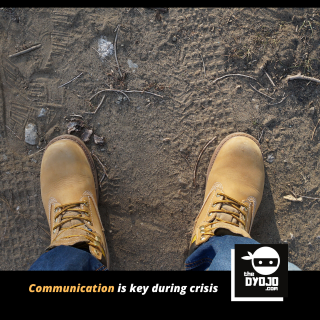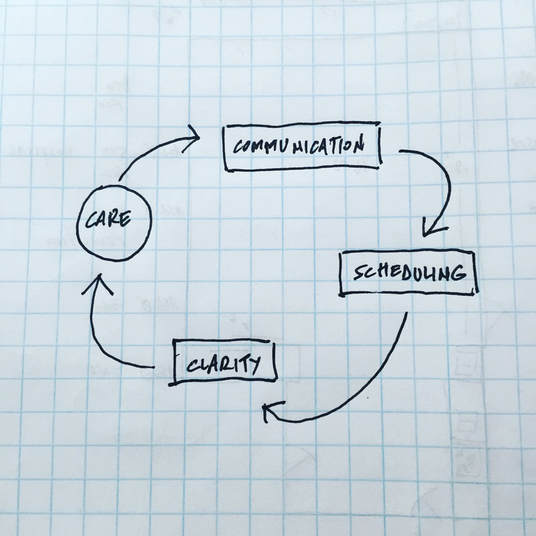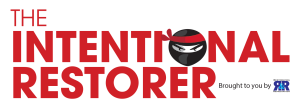|
In the skilled trades and service industries, we often are hiring young people with little work and people experience and expecting them to excel with minimal training. Somehow, we expect them to magically acquire skills that we barely master, including communicating with customers. Eric “The Tech Whisperer” Sprague joined us for The DYOJO Podcast and discussed the backwards thinking he had as a manager expecting twenty somethings to be able to explain complex service offering such as property restoration. He had to learn and develop a process for training his team members which he calls Morning Tech Meeting. Integrity is key when talking to customers Remember that communication is more than just talking. If your goal is to develop a thriving culture, then you will want to remind your team members that their integrity is essential. Most organizations have some variance of “do it right” as a core value, but few do much in the way of training to help team members understand how that applies to their work. Unfortunately, there are too many examples of people who will speak when without thinking about what they are saying or about things that they don’t fully understand. Perhaps that hits you because you are guilty of doing this. You are not doing yourself or your client a good service if you tell them something just to ease the tension or sound important. Train your team, and show them by example, that it is ok to NOT know the answer to a question. Training your team to talk to customers - Rule number one Whenever we would onboard new technicians, or in peak season when we would bring in temporary labor, I would give some variation of a speech about two great communication anathemas that weren’t to be practiced in our team culture:
Training your team to talk to customers - Rule number two Customer service, or better said, the customer experience, is essential to long term success. You cannot expect that customer service is common sense or that your existing team will pass down everything that you hold dear.
The habit of training your team to talk to customers If you are a manager and/or owner, when you train your team members to develop their mindset and habits, you communicate opportunities for growth which will also push you to continue to grow. This quote attributed to Richard Branson, is a strong encouragement to any organization that wants to thrive with their people, "Train people well enough so they can leave, treat them well enough so they don't want to."
0 Comments
Organizations that increase their communication and execution will thrive in spite of COVID-19. For most areas, even where stricter quarantine protocols are in place, construction is being considered as an “essential service”. Property restoration has typically been included in this designation as well. For those who are concerned about being excluded the Restoration Industry Association (RIA), Institute of Inspection Cleaning and Restoration Certification (IICRC) and National Air Duct Cleaners Association (NADCA) released a joint statement requesting Federal, State and Local Officials to consider our industries as essential businesses. Any contractor concerned about being included as “essential” should reach out to their local builders association and reference this joint statement. Crisis has a way of exposing the flaws in our existing processes. Organizations that were lax in their health and safety programs and continue to function with the mindset of “business as usual” will find themselves in peril. Many contractors and their employees are glad to continue working during this time as the economic impacts are a part of the overall picture of risk as we form responses to COVID-19. Many key voices in the industry have been rising to the occasion and doing their best to share sound information amongst peers. Some examples include:
Best practices for occupied worksitesWhile there are many unknowns with this novel coronavirus, in construction and property restoration the necessity of site health and safety is nothing new. From the AGC COVID-19 Job Site Practices, a few key additional precautions will help contractors to reduce the risk of exposure and potential spread of SARS-CoV-2. In addition to evaluating the specific hazards of each individual jobsite, some of these extra steps that should be practiced and documented when workers are entering occupied buildings and homes include:
Too often we take health and safety for grantedTo demonstrate that your company is committed to employee safety, a designated person in the company should be reviewing the ongoing release of information to update your organization's safety plan. Communication must increase during this time, and moving forward, rather than going radio silent and hoping it will all blow over. Hands on training should be performed and documented for everything which includes simple tasks such as washing hands, as well as pre, during and post work day cleaning protocols. Now is an important time to review your processes, which are often taken for granted, such as:
While many contractors are not engaging in COVID-19 clean up response, it is still important to understand what other service providers are learning about this issue. Whether you work for a restoration company that is considering coronavirus clean up or you are a GC that wants to keep you people safe, you will find value in the Three Tip Sheets provided by the Global Risk Advisory Council (GBAC), a division of ISSA.
Risk assessment and minimum measuresOn most construction sites, safety meetings are a daily occurence. One simple change during these unique times would be to have the supervisor sign everyone in rather than passing around a clipboard. Toolbox safety meetings should include discussion of and hands-on training for implementing the protocols mentioned above. Organizations will want to increase their documentation of communication, training and preventative measures, both to cover themselves from future scrutiny while also ensuring the information is reaching all team members. Worksite response should include partnering with the client to understand the potential for exposure. Asking questions such as, “Were there any persons, diagnosed or suspected, with COVID-19 who were at this site prior to our arrival?” A designated person should complete a pre-work evaluation of conditions and document these while creating a specific worksite plan which at minimum includes cleaning of touch points on a regular basis every day. The AGC recommends additional cleaning such as job site toilets to be disinfected by the provider at least twice a week, jobsite offices/trailers and break/lunchrooms to be cleaned at least twice per day. Now, more than ever, is a time for people in a position of leadership to step upLeaders need to lead. Crisis has a way of exposing the flaws in our systems. If you are resting on what you accomplished in the past or how you did things even a week ago, you aren’t leading and your company will struggle. With a little bit of thought, some clarity on expectations for this new world and a willingness to adapt as you all learn together, businesses can make some win-win scenarios that will keep talent as well as help them chart a path forward. Organizations should increase their level of communication with their team members during this time. Leaders should be on the front lines with their employees both to show them that we are all in this together as well as to have an ear open for strong ideas from the field that may come from sources that would otherwise be missed.  Scheduling is part of clarity, consistency & accountability. Scheduling is part of clarity, consistency & accountability. Winning habits aren't always the most complex. Enhance clarity to build consistency and establish accountability through the simple discipline of scheduling. Scheduling is the process of having a plan, or at least attempting to tell you day how you think it should go. Writing down your goals is important to do on the macro level of having a life plan, on the annual level of mapping out your course and on the micro level of having a daily road map. There is something special that happens when we take the time to write things down, there is some connection between the engagement of the brain and the enabling of the will that is connected to committing something to your calendar. Read more on the stories of successful people who are in the habit of writing down their goals, HERE. Scheduling yourself the day prior or early in the morning enables you to be ahead of your day before the chaos hits and the day takes on a mind of it’s own. If you don't schedule ahead, you will always be playing from behind. You never want to get behind, as we all know - that's where the farts are. Whether you schedule in blocks of time or are down to the minute, prioritization (more) starts with having a target. Real Estate mogul and Shark Tank star, Barbara Cocoran, swears by her daily to-do list which she hand writes every night, prioritizes with a simple rating system and emails to her personal assistant for accountability. In an interview with Inc. Magazine Barbara outlines her process, “I rate the items in order of importance: A, B, or C. The A's are where the gold is. These are the things that will move my business ahead and make me money. I find there are really only three to five A items on any given day, and I do those first.” Goal setting is a muscle that must be worked out on the daily, it requires mental strength, it will test your will power and it is enhanced by accountability from others. Setting aside time in your day to prepare yourself can be as simple as the habit of writing down your schedule. Organization in this way becomes a powerful habit that will help you to make gains on the items that are important to you. Like budgeting for your finances, a good plan will assist you to spend your time (which is impossible to recoup) where it is needed rather than be in a vicious cycle of questioning where the time went at the end of your day. Making your schedule visible to yourself and your team members creates a level of accountability as well as demonstrates leadership by example (more). Vince Lombardi has a great saying, “The will to win is not nearly so important as the will to prepare to win.” Who doesn’t want to win? Yet the thing that separates those who achieve success from those who talk about it is found in the preparation that winners put in. Those hours of discipline do not happen by accident, they come with a commitment to schedule in time for the things that are important, to prioritize and to persevere through the pain. Organization can be painful or just plain overlooked by many, but a successful system does not have to be complex to be effective. In terms of property restoration every production manager knows that our schedules have to be constructed with a certain amount of flexibility in them for those inevitable calls for emergency services from water or fire related damages. Drafting a schedule the day prior and making the plan visible for the team (more) are key to communicating that leadership respects the team and is committed to helping them to be prepared for the upcoming needs of our clients. Scheduling is a core communication component that shows our employees we care about them and creates a visible game plan through which we are able to communicate effectively with our clients as well (more). The discipline of scheduling your self should carry into the care of scheduling the team and the courtesy of communicating those schedules to our clients. The will to prepare to win starts with personal habits that translate into organizational systems that guide our core professional services. Being organized forces us to care about and budget our time. Scheduling generates habits that position us to pursue our goals with clarity, consistency and accountability. Simple things can be the difference between long term success (more) and cycles of chaos. Organizational truth: Don’t get behind, that’s where the farts are. References: More from Barbara Cocoran in her interview with Inc. Magazine, including video - https://www.inc.com/magazine/201704/anna-hensel/day-in-the-life-barbara-corcoran.html  Can't we all just get along? Can't we all just get along? Originally published as Shared Spaces: Shaking Up The Restoration In-Office Experience February 24, 2016 by Restoration & Remediation Magazine (R&R) By Jon Isaacson Could restoration companies benefit from a non-traditional work space? I started my career in property restoration in a shared office with myself, my manager and space designated for our crew to meet and interact. At most places I have worked since, the more normative office is laid out in designated segments of isolation. While I don't dismiss the value of personal space and enjoy my privacy as much as anyone, I have found the value of shared spaced and have worked to create open work space in every team that I have supervised. Shared Space Equals Shared Experiences When you share an office, you can feel the pulse of the team. You hear your team, even when you are not conversing with them directly, you are hearing their interactions. While there are times when the noise level has to be managed, when you hire people who are respectful they will likely already understand the dynamics of time and place in an open space. For our teams the benefits of a communal office within our department has far outweighed the perceived negatives. Imposing an open office on people who are not ready for it is a recipe for disaster. Transitioning to a shared space is made much more seamless when you have people who enjoy working together and/or you hire people who understand the culture. Implementing an open office is not of any benefit if it does not reflect your culture or add value to your team. Open Space Equals Open Communication Creating a shared space has allowed us to more readily share information at all levels of our department. Having our crew come into our office in the morning creates a natural opportunity to discuss the day's assignments. When the crew returns in the evening, we can debrief and discuss needs for the following day. These organic connection points throughout the day have increased our interactions at professional and personal levels. Combining our open space with making our workloads visible has helped us to elevate our clarity across our team interactions. Your office is your second home. Arguably, you spend more time in your work space with your work peeps than with your actual family, so making it an enjoyable and functional environment should be a priority. When drafting the plan for your work space - whether open, traditional or some other system with a fancy name - think about the following:
For our department, we have hired people who bring value to the team, we have been protective of the culture that we have developed and we have enjoyed the benefits of a shared work space. |
AuthorThoughts on personal and professional development. Jon Isaacson, The Intentional Restorer, is a contractor, author, and host of The DYOJO Podcast. The goal of The DYOJO is to help growth-minded restoration professionals shorten their DANG learning curve for personal and professional development. You can watch The DYOJO Podcast on YouTube on Thursdays or listen on your favorite podcast platform.
Archives
March 2023
Categories
All
<script type="text/javascript" src="//downloads.mailchimp.com/js/signup-forms/popup/unique-methods/embed.js" data-dojo-config="usePlainJson: true, isDebug: false"></script><script type="text/javascript">window.dojoRequire(["mojo/signup-forms/Loader"], function(L) { L.start({"baseUrl":"mc.us5.list-manage.com","uuid":"b9016446bd3c6a9f0bd835d4e","lid":"83282ffb9e","uniqueMethods":true}) })</script>
|
Jon Isaacson |
Connect. Collaborate. Conquer.
© COPYRIGHT 2015. ALL RIGHTS RESERVED.
|




 RSS Feed
RSS Feed